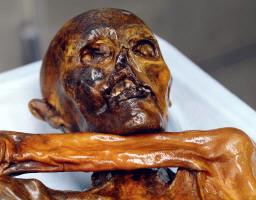Italy's famed Iceman mummy had an anniversary bash over the weekend as his purpose-built museum here celebrated ten years in business.
''Oetzi has been great for us, the city and tourism in the entire region,'' Bolzano Archaeology Museum Director Angelika Fleckinger said after the Copper Age man, 2,000 years older than Tutankhamen, notched up his two and a half millionth visitor.
More than a thousand people from all over the world helped set that mark at the celebrations which had special resonance for Fleckinger.
''Sometimes I think it is so strange. He died 5,000 years ago yet this person, this Iceman, has become an important part of my life''.
Forensic science has been made great strides since the Iceman was found in the Oetzal Alps - hence his nickname - by a couple of German hikers in 1991.
''We know so much about him, that he had blue eyes and a few diseases, was getting on a bit at 46, and died from an arrow wound.
''But we will maybe never know what really happened in the last hours and minutes of his life''.
The Iceman may still be something of a mystery but his generosity to his adoptive home town is no secret.
According to the most recent figures, the refrigerated man earns a total of four million euros each year for restaurants, hotels and souvenir-sellers, Fleckinger said.
Year round, except for Christmas Day, New Year's Day and Labour Day (May 1), he also raises 3.5 million in ticket fees at the restructured bank that houses him.
That means he pays about half of the Bolzano Archaeological Museum's costs, drawing in over one thousand people a day.
This compares to the average of 15% which other Italian museums defray out of visitors' pockets, the museum said.
The Iceman's status as a global star is proved by the 26 documentaries made about him by the world's TV companies.
He is perhaps the world's most famous mummy outside Egypt.
The body, which dates back to 3000 BC, has spawned a global cottage industry of studies since he was found in a glacier in the Oetz mountain valley in 1991.
There have been discoveries about what he ate and what illnesses he suffered from, as well as a keen debate on how he died from the arrow wound found in his body - initially, it was thought, in a fight with rival hunters.
One theory says he was assassinated in a tribal power struggle.
Another suggested he was the victim of ritual sacrifice.
Another study - fiercely contested by patriotic residents of this formerly Austrian region who see Oetzi as their proud forefather - reckons he was cast out from his community because a low sperm count rendered him childless.
An eerie aura has also grown around the Iceman because of the allegedly mysterious deaths of seven people who came into contact with him soon after he was found.









